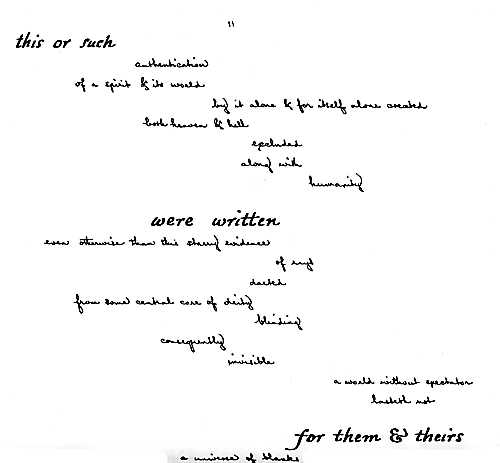John Tranter reviews
Musicopoematographoscope
by Christopher Brennan
Introduction by Axel Clark
Hale and Iremonger, Sydney, Australia, 34 pp. $29.95. ISBN 0-908094-88-4.
This review is 900 words or about 3 printed pages long. It was first published in the Sydney Morning Herald, 9 January 1982
Brennan’s tinker’s damn
When the May 1897 issue of the Paris journal Cosmopolis arrived in Australia, it passed largely unnoticed among the Colonial literati.
They had barely come to terms with a Tennysonian view of the gum tree [the eucalypt, common in Australia] and a Wordsworthian approach to the noble savage, and could hardly be expected to find much in Cosmopolis to admire, though some must have been considerably amazed by the long and relentlessly difficult poem by the 55-year-old French poet Stéphane Mallarmé.
It was called “Un Coup de dés” (“A throw of the dice”) and littered itself across more than a dozen pages in a bewildered mixture of type-face — small capitals, large capitals, huge capitals, lower-case, roman and italic type. The first page contained only four words in massive type; on other pages a kind of free verse staggered from one margin to the other.
As its author said in a prefatory note, it “participates unexpectedly in special pursuits dear to our time, free verse and the prose poem.” This, 84 years ago. [This review was originally written in 1982. J.T.]
A 27-year-old assistant in the New South Wales Public Library, Christopher Brennan, was one of the first to see the poem, and took special notice of it. He had read Mallarmé’s work in Berlin while on a travelling scholarship four years before, and it had impressed him. We may never know exactly what he thought of “Un Coup de dés”, but a few months later he sent a note to a close friend, Dowell O’Reilly, who at that time was Labor Member for Parramatta in the New South Wales Legislative Assembly. Part of the note read “You tell me to please the public and make money, whereas you yourself neither write, nor please the P., nor make money.”
He added that he had a “big MS” for O’Reilly, and that manuscript, in photolitho reproduction, is the main substance of the book under review.
It consists of twenty pages of free-form verse, hand-lettered, in a clever parody of the style of Mallarme’s “Un Coup de dés” (and as such it is probably the first ever parody of free verse in the history of English literature). The main burden of its complaint can be traced by following through the poem the words in large capitals: “I don’t give a tinker’s damn for the public and they return the compliment.”

Sample of Brennan text
The sub-text which weaves itself around the main theme amplifies and counterpoints this angry cry. The original is punctuated by line-breaks and white space on the page: I have supplied approximate comma punctuation for this extract:
They, Bentley’s bungler’s [sic], from the leather and dust I long ago renounced, hither rush, hawklike their claws and dirty their nose [sic] scenting a virgin prey…
Brennan’s collection XXI Poems had been published by Angus and Robertson at the end of July 1897. The Sydney press had reviewed it with a promptness which today’s reader of reviews would find startling — five reviews appeared within a month. They were largely dismissive, and Brennan was obviously wounded. He included extracts from each of them on the last page of Musicopoematographiscope, and one from The Bulletin could well represent them all: “lost in misty ideas and whirling verbiage...”
Nearly thirty years before Mallarmé published “Un Coup de dés”, his contemporary Rimbaud had insisted that “one must be absolutely modern.” It was Brennan’s inability to see the point of this view that condemned him to archaisms of thought and language, and his poems to ineffectuality.
The philistine’s response to his poetry was only partly wrong. Mallarmé’s intellectual and linguistic rigour has slowly vindicated his work of the early charges of preciosity and obscurity: Brennan’s verse, while valuable in many ways, cannot hope to be redeemed to quite the same degree.
“Those who fail to profit from the lessons of history,” wrote the American philospher George Santayana, “are doomed to repeat them.”[1] There are lessons in Brennan’s life and poetry, and this very personal early work reveals them more clearly than any of his printed poems could.
This book also contains a four-page poem called “Pocket Musicopoematographoscope”, consisting of a brief note to his friend O’Reilly elaborated again into a parody of Mallarmé, and is of less interest than the longer poem.
Axel Clark’s introduction is brief, scholarly, lively and informative — the very model of what a good introduction should be. The book itself has been designed with care, and has been printed and bound with a rare combination of lavishness and skill. The manuscripts are photographically reproduced, and the beauty and variety of Brennan’s calligraphy alone is a good enough reason to buy it.
Note
[1] I had no access to digitized encyclopaedias when I first wrote this review in 1982; if I had I should have quoted Santayana correctly:
“Those who cannot remember the past are condemned to repeat it.”
George Santayana (1863–1952), U.S. philosopher, poet. Life of Reason, “Reason in Common Sense,” ch. 12 (1905–6). William L. Shirer used this quote as an epigraph in his The Rise and Fall of the Third Reich (1959).
[from The Columbia Dictionary of Quotations, licensed from Columbia University Press. Copyright © 1993, 1995 by Columbia University Press. All rights reserved.]
it is made available here without charge for personal use only, and it may not be
stored, displayed, published, reproduced, or used for any other purpose
This material is copyright © John Tranter and Jacket magazine 2006
The Internet address of this page is
http://jacketmagazine.com/29/musicopoem-rev.html
